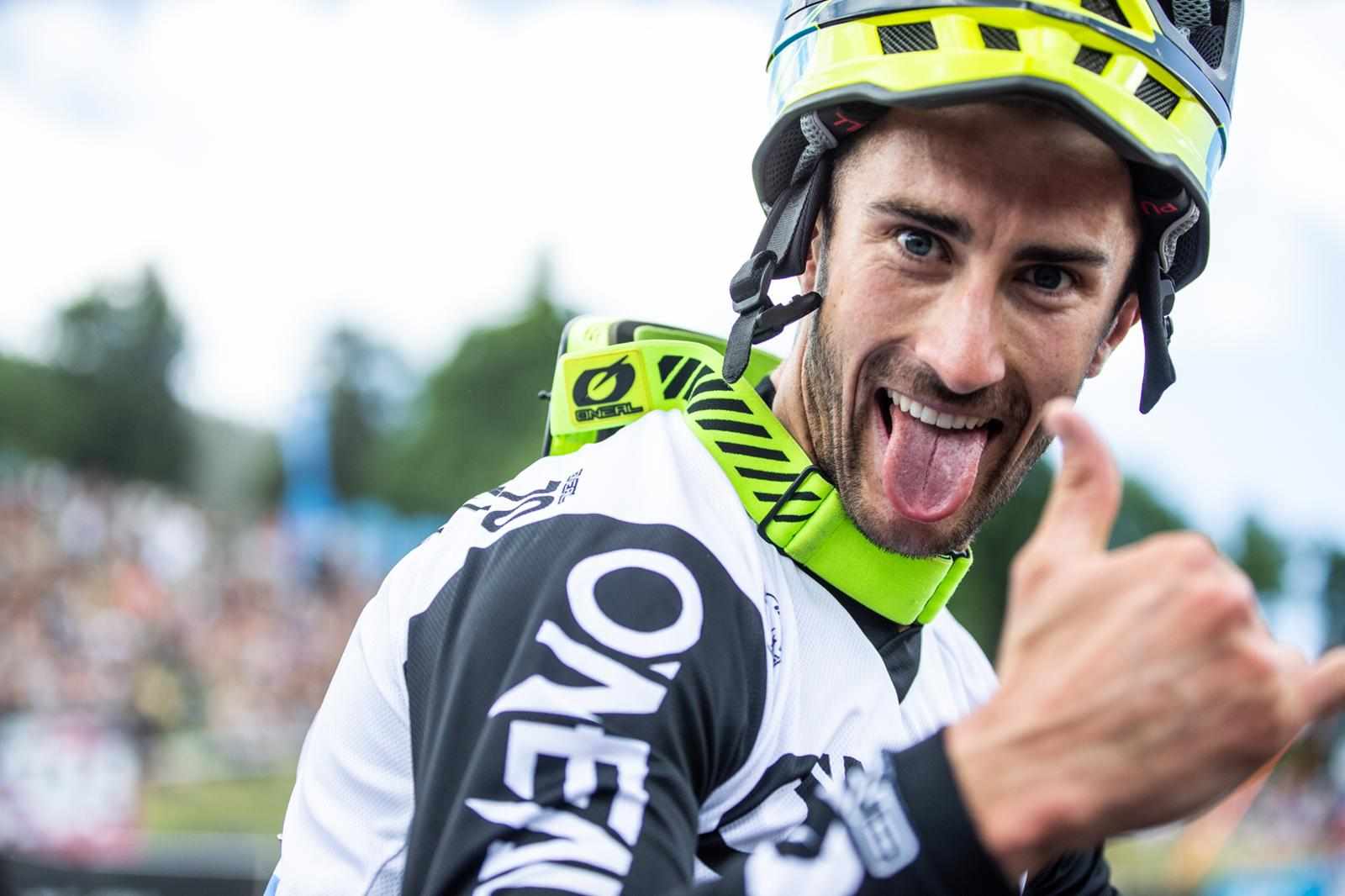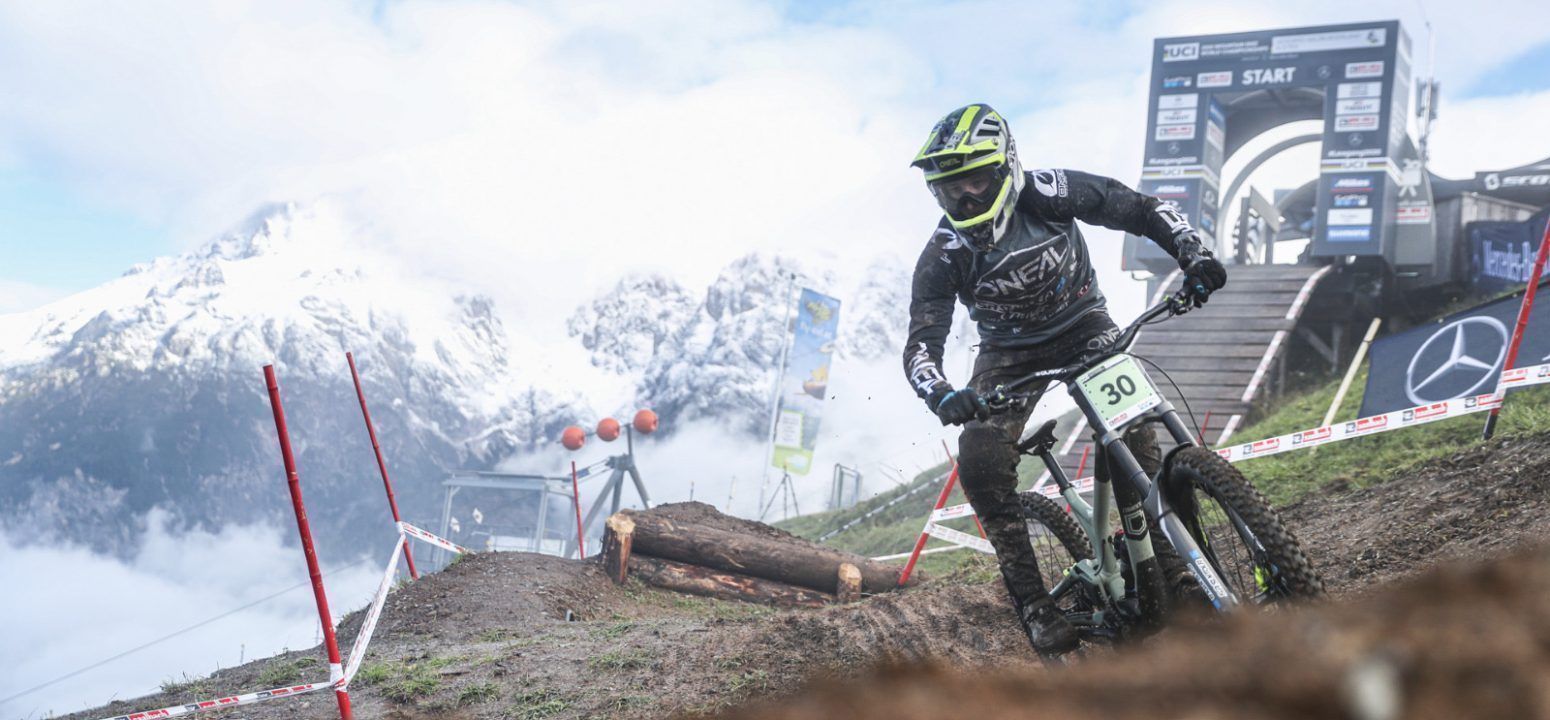Racer and team manager Jack Reading explains why he thinks British Cycling is failing its downhill athletes.
This article will be accessible by Free Members on the 23rd November. It will be accessible to non-members on the 25th November.
My name is Jack Reading, and I have been racing World Cup downhill for the last 10 years. Apart from one season racing for a small Swiss based team, I have raced as a privateer, or for One Vision Global Racing, my own professional race team. I started this team, with my Dad, in 2015 because it was so difficult to get effective help at the World Cup events.
In my career I have achieved World Cup top 20 results, won a British National Series race and represented my country at World Championships in 2017. I have a Masters degree in Optometry and have always worked as an Optometrist while racing professionally. For most racers there is very little money to be made in mountain biking, so I have never been in a position where I could afford to stop working and focus fully on racing. Currently I have three main jobs, Optometrist, professional athlete and team owner/manager.

The aim of our team was to support my racing, and for the first four years we were registered as a UCI MTB team, taking pit space to the World Cup races and competing against the best. In a clear attempt by UCI to discourage the existence of smaller teams, 2019 saw the team fee for small MTB teams like ours raised 25%, but for the elite teams it was left the same. We had to conclude that it wasn’t either affordable or cost effective to register as a UCI team. As a result we have even more disadvantages to overcome at the races. One of the team’s other goals has always been to help UK based riders. These riders didn’t have the support they needed to be able to race around the world. In six years we have helped six riders with their ability to race World Cups and our latest signing is junior rider Dan Slack.
This brings me to the subject of this article, which is the involvement of British Cycling, or should I say lack of it, when it comes to supporting world level downhill racing. When I raced the 2017 World Championships held in Australia, virtually everything was funded by British Cycling. They had a number of staff helping us including management, trackside line spotters, bike mechanics and a physio. We were looked after like the professional athletes we were, and it was thoroughly effective.

Credit: Remy Vroonen
As British Cycling had provided no support for World Cup races, this was an incredible experience for me, and it undoubtedly helped me to perform to my full potential. The year before, when I had raced the same track at the World Cup, I struggled and finished 54th. However, in 2017 at the World Championships I had the 12th fastest top split in my race run and finished 25th, making one small mistake in the lower sector. A massive improvement on the year before, and the great level of support I had must have had an effect.
Fast forward to this year, and the World Championships in Leogang, and we have a very different situation. British Cycling has now removed virtually all funding for the British team of downhill riders. The only funding was to send just one member of staff to help the riders with everything that goes on at the event. This was instead of the team of staff they had previously allocated.
My junior rider Dan Slack won the British Downhill Series in 2019, after only one season of downhill racing, so was selected to race at the World Championships this year. As I wasn’t a top seven elite rider from 2019 I didn’t make the selection criteria and wasn’t picked for the team. I had to make the decision as to whether to take my team setup all the way to Austria to support Dan. I run a relatively small team and we have to be very careful with our limited budget. However, my passion for athlete development greatly outweighed any monetary concerns I had, so we packed up and headed off to help Dan at the event.
The team setup for the week included myself as manager/cook/line spotter and general dog’sbody, and my personal mechanic Elliot Bond who would work on Dan’s bike for the week. We then had the 8m x 6m pit space with everything Dan needed including tools and spares. We also had the support from SR Suntour suspension technician Kevin Allemend who we pit next door to. Unfortunately not all the British riders were lucky enough to have this level of support. British Cycling provided these riders with absolutely nothing. They had nowhere to pit in the terrible weather, so most of them had parents or a friend standing at the bottom of the track with an umbrella and a bag of tools to try and help out between practice runs. The parking for these riders was about a mile down the road. Trying to prepare and race in this situation makes performing at your highest level practically impossible. Remember these riders were not just representing themselves but are actually racing for the British downhill team.
British Cycling is our national cycling federation, so the UCI provides a 30 square metre pit space for the event, free of charge. From this riders can (or could…) base themselves along with their mechanic, tools, spares, food and whatever else they need. This area is supposed to be for the XC and DH teams. However, this year British Cycling gave the entire area to the XC riders, leaving the downhillers literally out in the cold and wet. British Cycling also paid for the XC riders’ travel and accommodation costs, as well as their food for the week. Again providing nothing for the downhill riders, leaving them to organise and pay for everything themselves. Finally, British Cycling brought a team of staff for the XC riders to help with all of the athletes’ requirements, but only provided one member of staff for the downhill riders. I must say here, this person worked tirelessly all week doing his very best to help the riders with all aspects, from registration to track side line advice and everyone was very grateful to him.
Maybe you are reading this and thinking that the XC team must be more successful, and as a result receive virtually all of the available funding and resources for the World Championships. That certainly isn’t the case and in fact the opposite is true. The downhill team, made up of 18 riders, won three medals including Elite Men’s gold by Reece Wilson, and Junior Men’s silver, which I am very proud to say was my Junior, Dan Slack. The team achieved eight top 10 results. The cross-country team had nine riders and won just one medal, none at all in the elite categories, and achieved only three top 10 results. I am not at all belittling the successes of the XC athletes, but I am simply trying to compare the relative achievements of the teams and the allocation of BC support given to each.

Credit: Remy Vroonen
The one involvement British Cycling chose to have with the downhill World Championships, was to share photographs of the success of the riders. An audacious attempt to claim some kind of involvement, or credit for their achievements, after providing absolutely no help whatsoever.
As far as I understand it, the main reason British Cycling practically ignores downhill mountain biking on the world stage, is simply because it isn’t an Olympic sport, and that’s supposedly where the money comes from. However let me add this piece of information. At World Cup races British Cycling is allocated pit space for its downhill riders that have been selected to race for the national team. British Cycling doesn’t send anyone to help these riders, or provide any funding. But more significantly, at a World Cup where there is just Downhill, and BC don’t send a representative to man the space, it is left vacant. The British riders aren’t allowed to use it. Whether there are XC racers who ‘need’ the space, or not, the Downhill riders are left to fend for themselves when it comes to finding pit space. I can tell you from personal experience from years of racing World Cups, this will leave them pitting out of the back of a rental car or their own van, and not actually being allowed to park on site at the event.
Imagine coming down from a practice run with a puncture and having to push the bike a very long way to your resources. Imagine instead that you’ve got a spot in the pits, perhaps even under a cover… you don’t need to be a pro racer to appreciate the difference that would make to your ability to ride.
I personally believe British Cycling is wasting a fantastic opportunity to be much more involved in the most exciting and engaging form of cycling. Our nation has great strength and depth when it comes to talent in downhill mountain biking. British Cycling should be using this to promote itself nationally, and should be reaching out to find funding to support these talented riders and help them race against the best. Just look at how much progress the French downhillers have made in the last few years. Their national federation is fully committed to supporting their riders, providing training camps and all sorts of resources.
If I am able to help through my small team, bringing in funding and support from brands, which then helps riders like Dan win a World Championship silver medal, imagine what a huge organisation like British Cycling could do if it actually got seriously involved.
I would love to see a rethink by British Cycling, and them get right behind downhill. Starting at a national level, with development camps for riders, and taking it all the way to a World level GB downhill team. With proper support for riders who are striving to compete on the world stage we could once again be dominating those top spots. As it stands they should be ashamed of themselves providing almost nothing, then trying to enjoy the credit for an athlete’s success at the World Championships!
Comments (28)
Leave Reply
Post Comment



Sad stuff but not surprised, BC float into whichever disciplines work for them and always have done, it really is an embarrassing situation, the empty pits space says it all.
Sadly nothing will change unless downhill becomes an Olympic sport. Does this article really need to be a members only one? This should be publicised as widely as possible.
That’s rubbish really – but then I had a look at their website and saw that they weren’t even acknowledging the Junior DH results! Regardless, well done for stepping up and helping, it was great to see our riders doing so well at the World Champs. As you say, imagine what they could achieve with a bit of support. Further examination of the website shows a general lack of engagement with MTB compared to road/track. So British Cycling don’t appear particularly bothered about us anyway. Why would I become a member?
Many people (including myself) have been critics of BC’s involvement in all levels of MTB for a good long while now. It goes all the way back to the 90s – they’ve long been the brakes on what could be a much more successful sport in the UK.
It always seems to me if the bike doesn’t have dropped handlebars then BC aren’t interested. I spent a year as the secretary of our local MTB club, the number of communication from BC that featured MTBing were almost none existent. Swapped to Cycling UK who seem to want to engage with the MTB community at the time, not sure of the current bias. I would be interested to know the number of people that MTB in the UK verses those that ride track. Not saying that track shouldn’t be supported, but some more support for those other disciplines would be nice. It seems that so many sporting governing bodies loose touch with the wider grass roots.
I have to be a member of BC to keep my MTB Leader current. Every time they send out the survey (must be every 8 weeks) I take time to feedback the lack of MTB help. It winds me up that I have to support them, but they do not support my sport. I would say that British Canoeing seem to have it right, but a lot of that does come through the club model which does not really exist in mountain biking in the same way.
How can the mtb community change this? Can the support be managed outside of bc at least at a grassroots level? Then at least there is something viable to propose at a World Cup level. If bc aren’t interested why wouldn’t they make way to allow others to provide support?
This is disappointing to read, but not really a surprise.
My experience of BC/ScottishCycling is that of focus on road, of disorganisation and of some rude and unprofessional staff.
Surely there can be a way of moving this on. Look at what this guy, Cathro and some of the Enduro gang are achieving with the DH and Enduro riders – how do they get together and form an organisation that both can support and move the UCI on from BC as the recipient if thier national designation?
Well reading that was a very disheartening experience and hasn’t helped the overall mood at these tough times.
What I find even more frustrating about this is that the BCF are missing a trick when it comes to encouraging kids to get on bikes. Which discipline has a significant “cool” presence on the internet and if you were to line up a series of different types of bikes and associated athletes in their gear in a school playground which do you the kids would think is cool? Carbon road bike, disco-sandals and lyrca nappies or a downhill bike with a rider with their full face lid etc.?
Each year I have regularly pondered whether I should renew my BCF membership, think I now know what I’m going to do…
Sadly
Great article and sad situation; BCF should be ashamed.
Totally agree.
GB racers are successful despite BC in mountain biking, not because of. In spite of having more World Cup wins and World champs in DH than anything else.
Interesting that British Canoeing (BCU) is held up as a good example. Certainly 20 25 years ago BCU was shiiiite at supporting anything other than slalom on white water (the equivalent of cyclo-cross for biking) or flat water regatta lake based races (the poor relative of rowing, and akin to track cycling- a minority niche in a minority niche sport).
Regular paddlers (akin to the joe public trail riders) were sold down the river, metaphorically and literally to the advantage of slalom.
British Cycling seems exactly the same today.
I dropped my BCU membership and coach quals (for the little they were worth or meant). And similarly don’t pay BC anything as it fails to represent anything I do.
(I’m in the British Triathlon Federation as a member + in an affiliated club. One thing they are very ver good at is supporting grass roots and participation – they support elite (ITU = up to Olympic distance, but not ‘ironman’) but not by throwing the grass roots masses to the wolves.
BC could learn some lessons from them – if only they weren’t so pre-occupied at hiding bullying, cliques, ordering jiffy bags, and the whereabouts of T patches.
STW Mods, can this article be made public, rather than members only? More of our community need to be aware of this situation.
Thanks
This is typical of most sports governing bodies. Funding is provided by the government and National Lottery purely on the sports ability to deliver Olympic medals. Nothing else. They are audited on this and have to prove that all the funding has been spent on delivering this. I have been involved with non Olympic disciplines in kayaking trying to get funding from the governing body and where the picture is the same, the Olympic disciplines have huge budgets and the non Olympic virtually none. Im not for one minute saying this is right and how it should be, its not. But until government changes the basis for funding sport nothing substantial will change.
Not supporting racers at the Worlds might seem like a pretty poor show, but this hasn’t exactly been a normal year, has it? British Cycling haven’t been watching developments from their ivory tower, they’ve lost a huge chunk of their income from races and events not happening. Staff have been let go, programmes have been shelved, and the focus has shifted towards “How can we make competitive sport happen at all under the current circumstances?”
I’d be frustrated too if I was in Jack’s shoes (and I’m humbled by the level of commitment he’s shown to his racers) but is instigating another pile-on going to achieve anything constructive?
I have to say the situation has always been dire. Cross country in England and Wales has been held back by the ” No test of speed on Bridleways” law. No surprise that Isla is Scottish. BC and CTC have never understood the importance of grass roots racing, or if they have they’e been really ineffectual. As has been said if BC don’t think they can do well at the Olympics then they don’t spend resources. That to a great extent is due to the Government sport funding rules. It’s not going to change.
But if you read the OP, BC were supporting the XC riders at the world champs, just excluding DH. Which is odd, because if DH ever did become an Olympic Sport (which it should, as it’s a lot more photogenic than XC racing) we’d clearly be badass!
And if you read the other posts, a lot of them are recognising that British Cycling does not really represent them. I think that’s worth pointing out, in the hope that things might change.
That’s a sad state of affairs and certainly not something I was aware of.
Seems that you need to be either grassroots level or an Olympic contender to receive funding from BC, but not if you fall between. Real shame. From BCs website: https://www.britishcycling.org.uk/fundingpartners
Also seems like the UCI prefer to support ‘serious’ cycling, like riding round a wooden oval track, than ‘cool’ cycling like DH, to push for it to be an Olympic sport.
Chris Boardman discusses this in his auto-biography wrt funding for road racing vs track. As track has more Olympic medals and a good chunk of their funding has to be spent maximising the chance of winning gold medals, they ignored Nicole Cooke and poured all the money into Track racing. If they don’t win Gold medals the funding will be reduced / revoked, so the rules of the game are you only get funded for Olympic medals.
@RichPenny. That again is because of the Olympic status of XC racing. The worlds is part of the pathway and panning towards the olympics so they try to support it in the same way.
If DH does become an Olympic sport then the funding landscape will change considerably. It will never match track because each track athlete usually has the chance to win more than 1 medal so will always be the best value when it comes to the cost per medal calculations that control elite level funding
“What I find even more frustrating about this is that the BCF are missing a trick when it comes to encouraging kids to get on bikes.”
Because in my experience event at introductory / youth bike club level the focus is already on track, road and XC because of olympic aspirations.
Do we know how much support other countries’ national associations support their DH riders?
What do the French do?
Sad state of affairs. What is really telling is that there seems to be no engagement with those in the sport. Surely they would be better to at least have a form of dialogue with those in DH and at least not just stonewall them? Even if it just to clarify the funding position of the BCF? Smells of cowardice and poor management.
Historically & currently GB has many world class riders in the downhill scene, yet our UCI approved national body has starved them of funding & resources? I’m not surprised tbh, They don’t have the courage to look outside of their little world of elitist clubs and events that they run for xc riders as DH is considered too much a risk / injury sport for them to run. Yet….if they looked at the marketing potential from supporting dh they could have bulging bank balance to support all forms of cycling sport.
This is crying out for a response from BC, I wonder if Singletrack have thought to ask them for one?
#journalism101
@chakaping Jack was in touch with BC contacts while preparing this piece, but we’ll ask if BC wants to provide any official response.
Seems like there is an opening in the sport for a separate governing body specifically for MTB in the UK. If BC don’t have the ability/will to support some of the most successful sportspeople in the country surely the UCI should allow a “BMTB” organisation to step in?
This is nothing new from BC, even XC has been treated as the poor relation over the years. Not sending riders to gain qualification points for the Olympics, only 1 male & 1 female rider at London 2012. I remember reading articles in the 90’s about riders having to buy their own kit to represent the Country at World Champs & Olympics. Read Si Paton’s comments on why he wound up the running the DH National Champs. I get that funding is based on Olympic medal results, however the National body, should be supporting the sport at all levels & disciplines. BC have had main sponsors, Sky & HSBC over the last few years, hardly small companies. The Olympic Track team can afford those nice shiney Hope/Lotus CF bikes. Their social media channels can almost live stream track & road events, yet MTB might get a mention of a WC Jersey about a week later. Change is needed, it seems that BC is reluctant to change. I see more people out riding MTB’s than road bikes, especially youngsters. It seems stupid not supporting the MTB disciplines.